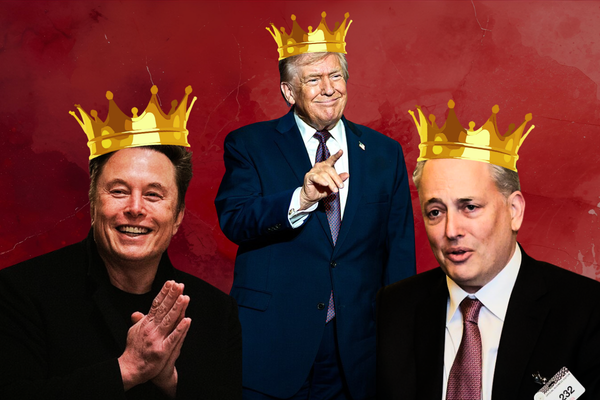Issue 89 – Crypto wins in Washington with midnight calls, chocolate bars, and a $141 million threat
Trump stands to profit from a $2 billion bitcoin bet as the crypto industry pushes through bills aimed at bolstering the sector


With President Trump’s signature, the Genius Act stablecoin bill is the first significant US cryptocurrency legislation to become law. The bill passed the Senate on June 17 [I86], the House on July 17, and hit Trump’s desk the following day. During the “Crypto Week” blitz, the House also passed the Clarity Act market structure bill and the Anti-CBDC Surveillance State Act, two other crypto bills that will now go to the Senate [I88].
Many crypto billionaires who attended the signing had spent millions installing crypto-friendly lawmakers in Congress and backing Trump last election cycle in hopes of this moment. Trump thanked them for their campaign support and blasted the Biden administration, remarking, “half of you were under arrest for no reason”, and later adding, “I got you guys out of so much trouble”. Speaking of the Winklevoss twins, who run the Gemini crypto exchange and are among the industry’s big political spenders, Trump said, “They’ve got plenty of cash, and it’s great that you’re on our side.”
Note: I retained Trump’s comments about Biden to avoid taking his statement out of context, but his claim that Biden “dropped all charges” against crypto executives during his (or Harris’s) campaign is false.
In the White House
The House’s Crypto Week got off to a shaky start with a logjam of record-breaking duration.a Members of the Freedom Caucus — the right-most segment of House Republicans — blocked procedural votes, demanding assurances that the Anti-CBDC Surveillance State Act [I88] would pass.1 Republican lawmakers, Trump himself, and the crypto lobby were out in force to push through the vote, with Trump describing 2am phone calls to give “a little love” to the Republican holdouts.2 Crypto companies and advocacy groups spent around $6.9 million on lobbying just in the past couple of months,3 much of it supporting these bills.
Coinbase spent six figures on a Crypto Week ad blitz targeting members of Congress, running print ads in the Washington Post and the Wall Street Journal and video ads on social media. They even tried a gimmick in which they installed chocolate bar vending machines on Capitol Hill, dispensing custom chocolate bars with labels repeating their own highly dubious poll, proclaiming that “Crypto is like a bar of chocolate. 1 in 5 Americans eat chocolate daily; 1 in 5 Americans also own crypto”.4


“Seems sus”, writes photographer Joe Flood (photo 1, photo2; both CC BY-NC 4.0, used with permission)
The largest crypto super PAC, Fairshake, strategically picked Crypto Week to issue a press release announcing they have $141 million on hand for the midterms, from donors like Coinbase, Andreessen Horowitz, Ripple, and Gemini.5 This amount is already more than they spent in the entire 2024 campaign cycle, including funds distributed for spending by related crypto super PACs. The message was clear: pass our bills, or we will spend this money — and likely more to come — against you in 2026.
After reaching a deal to glue the Anti-CBDC bill to the must-pass defense spending bill, the roadblock was cleared and all three crypto bills ultimately passed the House.6 The Genius Act passed 308–122; Clarity passed 294–134; and the Anti-CBDC bill passed 216–192.
Clarity and the Anti-CBDC bill will now go to the Senate. Some reports suggest that the Clarity Act may encounter Democratic resistance due to Trump’s crypto self-enrichment,7 although similar resistance failed to prevent the Genius Act from passing the Senate with the support of eighteen Democrats [I86]. Others suggest it may stall in a different way, as segments of the crypto industry may push for a bill that takes a different approach to key portions of the Clarity Act, such as the classification of blockchains as “mature”.8 Indeed, several prominent pro-crypto Senators have just released a discussion draft for their own market structure bill. It defines another category of “ancillary assets” — digital assets that are sold “in connection with the purchase and sale of a security through an arrangement that constitutes an investment contract” — in an apparent attempt to capture tokenized equities within the bill’s language. While some describe this as a solution to the Clarity Act’s massive loophole for those who wish to sell stocks without SEC oversight, the current version of the Senate’s draft also carves out “ancillary assets” from the securities category, and its registration, oversight, and disclosure requirements are substantially weaker than those of the securities regime.
The Genius Act, already passed by the Senate, quickly went to President Trump’s desk. It requires stablecoin issuers to fully back their stablecoins with dollars, short-term Treasuries, and other permissible liquid, low-risk assets, and to issue regular statementsb describing their reserve composition. The bill also lays out requirements for redemption policies, subjects issuers to the Bank Secrecy Act and its anti-money laundering and sanctions compliance requirements, and defines the regulators responsible for overseeing stablecoin issuers.
Critics of the bill have identified numerous shortcomings. In a June New York Times op-ed titled “The Genius Act Will Bring Economic Chaos”, economics and political science professor Barry Eichengreen compared the bill to the Free Banking Era of the 1800s, where reserve requirements didn’t prevent the proliferation of wildcat banks. “The problems that bedeviled 19th-century dollars are likely to be equally debilitating to the stablecoin ecosystem,” writes Eichengreen, concerned that accounting firms and regulators will fail to oversee the upcoming explosion of stablecoins, resulting in collapse and significant economic contagion. Consumer Reports criticized the bill for its lack of consumer protections, noting its limited auditing requirements, lack of redress for losses, and lack of explicit protections or oversight from consumer protection agencies. They highlight that the bill “does not clearly apply the Electronic Fund Transfer Act, UDAAP provisions, or other core financial safeguards that protect consumers from fraud, error, or unauthorized transactions.” EFTA is the consumer protection law that gives people some recourse if their Venmo account is hacked or someone skims their debit card and goes on a shopping spree; such protections may not apply to stablecoin transactions, and attempts to apply them later would likely meet the same vehement resistance from the crypto industry as we’ve seen in the past [I73]. UDAAP is the Unfair, Deceptive, or Abusive Acts or Practices authority, which, if applied to stablecoins, could offer protection against stablecoin issuers imposing hidden fees or deceptively marketing their stablecoin (for example, by comparing stablecoins to FDIC-insured bank deposits).9 Maxine Waters, Ranking Member of the House Financial Services Committee, penned an op-ed for MSNBC, warning:10
The CLARITY and GENIUS bills wrap themselves in the flag of innovation, but all they really do is replicate the same mess that led to past financial crises: They call for few regulations, minimal enforcement, weak consumer protections and more industry consolidation. On top of that, these bills have a special, intentional wrinkle that makes them especially dangerous: They would legitimize and legalize the unprecedented crypto corruption by the president of the United States.
Notably, the Genius Act gained support from even the most Wild West of the established stablecoin issuers, Tether, whose reserves and stability have long been a concern within and outside of crypto.11 In 2021, Tether settled with the New York Attorney General after an investigation found that Tether “for periods of time held no reserves to back tethers in circulation at the rate of one dollar for every tether, contrary to its representations”, and had repeatedly issued “self-proclaimed ‘verifications’” of reserves based on temporary transfers of funds to accounts under its control.12 Tether CEO Paolo Ardoino, who once conspicuously avoided travel to the US, stood behind Trump amidst other crypto executives and watched the President sign the Genius Act into law.13
Nearly simultaneously with the Genius Act signing, the Financial Times reported that Trump plans to sign an executive order instructing regulators to evaluate allowing crypto assets in professionally managed retirement funds such as 401(k)s.14 This is still very much in the concepts of concepts of a plan stage (Trump is considering signing an order to instruct regulators to investigate making a change), but it’s a concerning signal of his goals.
The Washington Post did a similar investigation to the one by CREW I mentioned last issue [I88], and found that one in five high-level Trump-appointed officials hold crypto. Among them is Bill Pulte, whose $1 million to $2 million in crypto investments may have influenced his June tweet directing Fannie Mae and Freddie Mac to prepare proposals that would allow the lenders to consider crypto as reserve assets for mortgages [I87].c
Trump business interests
As always, Trump’s enthusiasm for crypto in the White House is easily explained by his personal investments. His Trump Media & Technology Group, the business behind Truth Social, has just hopped on the trend to become a bitcoin treasury company [I84, 86], acquiring $2 billion of bitcoin as the asset hits all-time highs.15 They got the money from an equity raise and convertible bonds sale earlier this year, raising $2.5 billion in total [I85]. With this, the 52% Trump-owned company has become the sixth largest bitcoin treasury company.
He has close company in the list:16 Commerce Secretary Howard Lutnick’s Cantor Fitzgeraldd backs Twenty One Capital, the company in third place. Cantor Fitzgerald also backs Bitcoin Standard Treasury, in fourth place. Cantor is helping to bring both companies public via SPAC maneuvering, with the Twenty One Capital merger announced in April [I82] and the BSTR one announced just last week.1718 Metaplanet, in seventh place, boasts Eric Trump as a member of its strategic advisory board.19 Hut 8, which recently signed a sweetheart deal with the Trump sons’ American Bitcoin [I81], is in eleventh place. American Bitcoin is also on the list, much further down.
In courts and criminal investigations
The trial against Tornado Cash developer Roman Storm has commenced, and it’s not going well for the prosecution. In fact, it is going so badly that I’ve had to split my coverage of the saga into a whole separate issue, which you’ll receive shortly.
A portion of the October 2023 decision in Bored Apes creator Yuga Labs’ case against Ryder Ripps and his knock-off Bored Apes project has been reversed by the Ninth Circuit and remanded to the lower court for reconsideration.

While the Ninth Circuit affirmed the lower court’s decision to summarily reject Ripps’ counterclaims, it reversed the decision to grant summary judgment in favor of Yuga Labs on trademark-infringement and cybersquatting claims. “Yuga did not prove as a matter of law that defendants’ actions were likely to cause consumer confusion,” said the appeals court, and on the cybersquatting claim, “did not establish as a matter of law that defendants’ domains were ‘confusingly similar’ to Yuga’s protected marks.”20 The 2023 decision resulted in a somewhat unusual outcome, where Ripps and his co-defendant were ordered to pay $1.4 million in disgorgement, around $200,000 in damages, and a whopping $7.3 million in attorney’s fees and costs after the court found the defendants had been “obstructive and evasive” and made “disgraceful and slanderous statements about Yuga, its founders, and its counsel” throughout the case.
The Department of Justice and the CFTC have both shut down their investigations into Polymarket, a cryptocurrency-based betting platform that’s surged in popularity in the last year or so.21 Last year, investigators began looking into whether American traders were still placing bets on the platform even after Polymarket agreed to prohibit US bettors as part of a January 2022 CFTC settlement [I70, 73]. I could have told you they are, given that calling it an “open secret” in the crypto world would be dramatically overstating its status as a secret at all, but I guess that doesn’t matter now that crime is legal. This is all great news for the Peter Thiel-backed company, which has just announced its $112 million acquisition of a tiny derivatives exchange called QCX. While that may seem like a lot to pay for a relatively unknown company, Polymarket is likely just after QCX’s July 9 designation by the CFTC as a Designated Contract Market — a process that can take years, and is necessary for a company like Polymarket to operate in the US. Rather than wait, they’ve just bought one.22e
The FBI has closed its investigation into Kraken founder, chairman, and former CEO Jesse Powell.23 That was a weird saga all around, stemming not from anything crypto-related, but rather from allegations that Powell had “hacked and cyber-stalked” the Verge Center, a Sacramento-based non-profit arts charity he founded after it kicked him off their board in 2022. The group justified their decision by saying he wasn’t showing up to board meetings, and had violated the group’s “guiding principles” — a decision made almost immediately after the New York Times ran a story on how Powell was spending an awful lot of time in Kraken’s Slack channels starting debates on who’s allowed to use the n-word, sending messages about how “most American ladies have been brainwashed in modern times”, and inviting employees to a channel called #debate-pronouns where he argued against using pronouns besides those based on a person’s assigned sex at birth and questioned whether people can self-identify as different races or ethnicities.24 According to filings in a fraud and defamation lawsuit by Powell against the non-profit, the Verge Center claimed that Powell had blocked the group’s access to their email, Slack, and website management platforms after he was ousted, and set up an old domain with a website imitating the Verge Center’s that still listed Powell as a board member.25 Why the FBI got involved in the first place is not (and may never be) entirely clear — they do handle cybercrime cases, but generally not ones as seemingly petty as this. Powell’s lawsuit against the non-profit is ongoing.
In regulators
Those hoping to evade securities laws with tokenized equities may not need to wait for carveouts from Congress, with ally Paul Atkins serving as SEC Chair. Atkins said his staff are considering changes to “incentivize tokenization within our regulatory framework, including an innovation exception that would permit novel ways of trading and more narrowly tailored forms of relief to facilitate the building of other components of a tokenized securities ecosystem”.26 As Trump said at his recent Genius Act signing ceremony: “The crypto guys, they said—everybody said, not only crypto—they all wanted Paul for the position”. Atkins is certainly making it clear why.2
The Web3 is Going Just Great recap
There were three entries between July 12 and 23, averaging 0.3 entries per day. $74.5 million was added to the grift counter.
- CoinDCX hacked for $44 million [link]
- BigONE hacked for over $27 million [link]
- Arcadia Finance exploited for $3.5 million [link]
Worth a read
Brian Merchant highlights Politico’s editorial staff’s horror at their management’s decision to roll out an AI tool to summarize news events. It quickly published embarrassing gaffes, including posts with typos and fabricated quotes, and one parroting JD Vance’s description of an “influx of illegal immigrants” in violation of Politico’s own style guide. The AI summaries replace Politico’s usual, human reporting, and seem to contravene AI-related provisions of a collective bargaining agreement between Politico’s editorial union and management, ratified in 2024. The editorial union, called the PEN Guild, took Politico’s management to arbitration earlier this month, and I wish them success.
The Columbia Journalism Review just ran an excellent story highlighting the local, often indie journalists who cover extremism even at great personal danger. They seem to agree: even with the risk, it’s too important not to cover. Also, “a lot of extremism is just political reporting right now.”
In the news
I joined a BBC radio program to discuss the recent all-time high bitcoin price, Congress’s “Crypto Week”, and the three crypto bills. (I come on about 17 minutes in.)
I tried to help The Observer’s Sensemaker podcast make sense of crypto prediction markets like Polymarket, what happens when a market outcome doesn’t match bettors’ expectations, allegations of manipulated market resolutions, and the regulatory morass around prediction markets.
CNN cited my comments about the timing of Fairshake’s press release to send a message to Congress members considering the industry’s preferred legislation.
If you’ve ever found yourself wondering what my cell phone home screen looks like (and let’s be honest, who hasn’t), now’s your chance to find out. I’m featured in the “Screen Share” segment of this week’s Installer newsletter, where I hope I’ll convince you to use end-to-end encrypted messaging.
That's all for now, folks. Until next time,
– Molly White
Have information? Send tips (no PR) to molly0xfff.07 on Signal or molly@mollywhite.net (PGP).
I have disclosures for my work and writing pertaining to cryptocurrencies.
References
“Crypto Week Revealed the Dittohead Congress”, The American Prospect. ↩
“Trump Signs GENIUS Act Into Law: The Full Transcript”, CoinDesk. ↩
“Crypto Industry Boosted Lobbying to Pass Coveted Stablecoin Bill”, Bloomberg. ↩
“Crypto lobbyists blanket the Hill”, Politico. ↩
“Crypto super PAC Fairshake reports $141 million war chest”, CNBC. ↩
“Crypto bills advance after record stalemate in GOP House”, ABC News. ↩
“It’s a huge week for crypto in DC But the industry may not get everything it wants”, CNBC. ↩
“House's Crypto Markets Bill on Track, But Some in Industry Hope For Senate Overhaul”, CoinDesk. ↩
“House passes GENIUS Act that fails to protect consumers In stablecoin market”, Consumer Reports. ↩
“My colleagues in Congress are making a mistake advancing these crypto bills”, MSNBC. ↩
“Tether Papers: This is exactly who acquired 70% of all USDT ever issued”, Protos. ↩
“Attorney General James Ends Virtual Currency Trading Platform Bitfinex’s Illegal Activities in New York”, New York Attorney General. ↩
“Donald Trump set to open US retirement market to crypto investments”, Financial Times. ↩
“Trump Media builds $2 billion bitcoin hoard, as cryptocurrency swells president’s net worth”, CNBC. ↩
“Cantor Fitzgerald close to $4bn Spac deal with bitcoin pioneer”, Financial Times. ↩
“Everyone Wants a Bitcoin Treasury”, Money Stuff (Bloomberg). ↩
“Metaplanet Appoints Eric Trump to Newly Formed Strategic Advisory Board”, Decrypt. ↩
Opinion filed on July 23, 2025. Yuga Labs v. Ripps, 9th Cir. ↩
“Polymarket Probe Ended by DOJ in Win for Crypto Bets Under Trump”, Bloomberg. ↩
“Crypto-Betting Site Polymarket Set For US Return After Deal to Buy Tiny Exchange”, Bloomberg. ↩
“FBI drops probe of Kraken founder, returns dozens of seized devices”, Fortune. ↩
“Inside a Corporate Culture War Stoked by a Crypto C.E.O.”, The New York Times. ↩
“Stalking a charity: Why the FBI raided Kraken founder Jesse Powell’s home”, Amy Castor. ↩
“SEC to Weigh ‘Innovation Exception’ Tied to Crypto, Atkins Says”, Bloomberg. ↩
Footnotes
The more than nine-hour standstill broke records for the longest House vote in history, which had only just been set earlier this month with the protracted vote on the Trump “Big Beautiful Bill”. ↩
It’s important to note that such statements are not audited, and unlike an independent third-party audit by a qualified auditor, are simply self-reported. The Genius Act requires proper audits only from issuers with more than $50 billion in issued stablecoins, and only on an annual basis. ↩
As I noted then: “Pulte’s directive does not actually appear on the FHFA’s list of official orders and may have solely been issued via Twitter”. This remains the case, even a month later. ↩
Howard Lutnick followed the Trump strategy of “divestment” by just putting his son in charge of his company. ↩
Can you imagine if other things worked like that? “Rather than earn a medical license, I’ll just buy yours.” ↩





